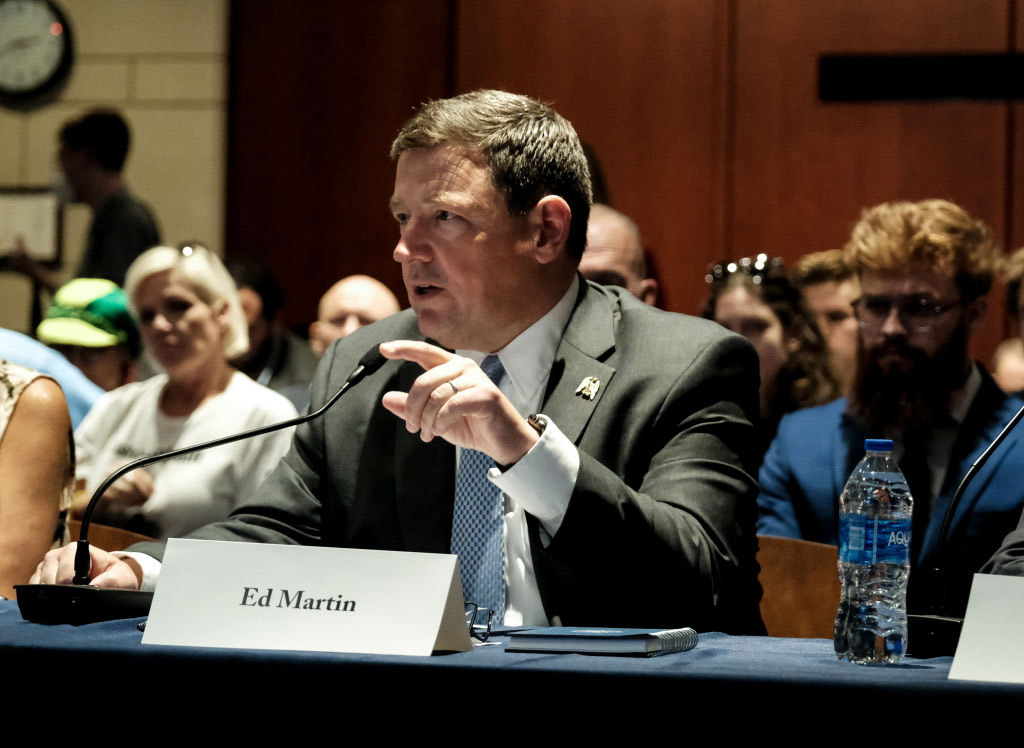Edward Martin, Jr., who was appointed by President Donald Trump to serve as Interim U.S. Attorney, sent a letter to the Wikimedia Foundation (WMF) on April 24 with a series of questions pertaining to its tax-exempt status from Jan. 2021 onward.
“It has come to my attention that the Wikimedia Foundation, through its wholly owned subsidiary Wikipedia, is allowing foreign actors to manipulate information and spread propaganda to the American public,” Martin wrote to the San Francisco-based nonprofit. “Wikipedia is permitting information manipulation on its platform, including the rewriting of key, historical events and biographical information of current and previous American leaders, as well as other matters implicating the national security and the interests of the United States. Masking propaganda that influences public opinion under the guise of providing informational material is antithetical to Wikimedia’s ‘educational’ mission.” He further alleged that “Wikipedia’s operations are directed by its board that is composed primarily of foreign nationals, subverting the interests of American taxpayers. Again, educational content is directionally neutral; but information received by my Office demonstrates that Wikipedia’s informational management policies benefit foreign powers.”
“It has come to my attention that the Wikimedia Foundation, through its wholly owned subsidiary Wikipedia, is allowing foreign actors to manipulate information and spread propaganda to the American public.”- Edward Martin, Jr.
Martin also noted that Google and other search engines tend to put Wikipedia at the top of their search results and thus has the potential to magnify content that is “biased, unreliable, or sourced by entities who wish to do harm to the United States.” Additionally, Artificial Intelligence (AI) programs use Wikipedia to train their large language models, which Martin warned could result in AI programs laundering “information on behalf of foreign actors.”
The interim U.S. attorney then asked 12 questions to the WMF.
“What mechanisms does the Wikimedia Foundation have in place to fulfill its legal and ethical responsibilities to safeguard the public from the dissemination of propaganda, particularly in light of its designation as a tax-exempt organization under Section 501(c)(3) of the Internal Revenue Code and in light of the Foundation’s longstanding hands-off policy regarding Trust & Safety (including content moderation and editor misconduct)?” Martin asked. “Regarding Trust & Safety, what does the Foundation provide in terms of employees and contractors, budget, day to day oversight and enforcement mechanisms, for the purposes of content moderation and actioning of editor misconduct? Here, editor misconduct includes but is not limited to content manipulation, bullying, and off-platform canvassing (for edits or committee elections).”
Martin also asked the WMF about its “transparency and accountability” over to what extent “its editorial practices and platform governance are influenced by ongoing relationships with donors, sponsors, funders, or other external stakeholders” and what the WMF does to ensure that viewpoint diversity is reflected in Wikipedia articles, including those that may be odds with the nonprofit’s donors. Other questions included what the WMF’s processes are for protecting Wikipedia articles from “foreign influence operations” and “what safeguards exist to detect and prevent undue influence by individuals or coordinated networks who use editorial or administrative authority to systematically distort content.” Martin also asked the WMF how it holds editors accountable when they purposely mislead readers as well as how the WMF audits the actions of administrators and members of the Arbitration Committee, Wikipedia’s version of a Supreme Court.
Martin also queried the foundation on editors’ anonymity, specifically asking why the WMF shields “editors from public scrutiny” and what safeguards the WMF uses to stop banned editors from creating new accounts; Wikipedia does have a mechanism for users to launch investigations into possible sock puppets. Martin also noted that Wikipedia has faced public criticism, including from co-founder Larry Sanger, who has long accused his former website of having a left-wing bias.
The final two questions from Martin asked the WMF what agreements it has with various third-party sites, including search engines and AI companies, and what actions the WMF takes to stop “harmful or illegal content” that was inserted into Wikipedia articles from being disseminated in search results and LLMs.
Martin gave the WMF until May 15 to respond.
WMF Associate General Counsel Jacob Rogers said in a statement to The Verge, “Wikipedia’s content is governed by three core content policies: neutral point of view, verifiability, and no original research, which exist to ensure information is presented as accurately, fairly, and neutrally as possible. The entire process of content moderation is overseen by nearly 260,000 volunteers and is open and transparent for all to see, which is why we welcome opportunities to explain how Wikipedia works and will do so in the appropriate forum.”
The Free Press, which first reported on the letter, quoted someone close to Martin as saying that the interim U.S. attorney that he is perturbed at particular Wikipedia entries regarding “the Israel-Hamas conflict that are clearly targeted against Israel to benefit other countries.” I’ve done extensive reporting on Wikipedia editors spreading anti-Israel bias on the site that can be seen in the “WikiWatch” section on The Journal’s website. The Anti-Defamation League also published a report in March highlighting how anti-Israel Wikipedia editors have been working in “close coordination” with each other. The Free Press’s source also told the outlet that Martin “is reviewing nonpublic documents detailing alleged ways that people with foreign IP addresses in ‘nefarious’ countries edit Wikipedia pages. They added that Martin is looking into how those content changes may influence ChatGPT or other AI models.”
Carolyn Iodice, the legislative and policy director for the Foundation for Individual Rights and Expression (FIRE), told The Free Press that Martin’s letter is “very alarming” because “is very alarming” since the WMF “hosts a huge amount of constitutionally protected speech, which implicates the rights of Wikimedia itself and its millions of readers and editors.” Iodice also accused Martin having a tendency “to bully people who say things he doesn’t like by sending them these tacitly threatening letters” over constitutionally protected speech. Martin himself is quoted an April 24 report in The Forward apologizing for praising a Nazi sympathizer and white supremacist and that he didn’t know about the person’s history. The Washington Post reported that “in videos and podcasts, Martin has defended the man since at least 2023, calling him a friend who was ‘slurred and smeared’ by antisemitism allegations.”
One editor told me that while Martin’s letter is “a nice idea,” they didn’t think that any sort of legal action would hold up in court. “Citing Sanger is a dead giveaway that the argument is poor,” the editor contended. The Post quoted Wikipedia editor Molly White as saying that Martin’s letter is part of the Trump administration’s (and their allies’) efforts to turn weaponize “laws to try to silence high-quality independent information”; the Post also quoted journalist and tech lawyer Stephen Harrison as saying that Martin is attempting to create “an American First version of Wikipedia.”
Prior to Martin’s letter, the longtime editor behind “The Wikipedia Flood” blog wrote at the end of an April 23 post criticizing Wikipedia editors for titling an article “Rafah paramedic massacre”: “Since Wikipedia clearly does not serve the public interest, one area that should be explored is removal of the Wikimedia Foundation’s tax-exempt status. The Trump Administration is expected to act against Harvard’s tax exemption. Whether that’s valid or not is for others to decide. But look at this article, this rubbish, this Hamas propaganda and ask yourself: Why does the U.S. taxpayer support a website that produce this drivel in not one but thousands of articles?”
Well…. how about that!https://t.co/dfvJdmMoI4 https://t.co/0aTHItCX7h pic.twitter.com/mTMc9VFKVs
— The Wikipedia Flood (@WikipediaFlood) April 26, 2025
An editor told me that they could not “really agree that Wikimedia will have its tax-exempt status removed though. It is controversial to do so for political reasons.”
But another editor told me that they “don’t think the WMF truly is prepared to confront [the fact] that the American public is not stupid, and will have very little tolerance for whatever gymnastical logic is deployed by Wikipedia when it attempts to answer Martin’s matter of fact questions. There is a very nasty wake-up call that is about to happen when the American public realizes the weak and absurd system of rules that the number one digital encyclopedia on the planet operates under.”




